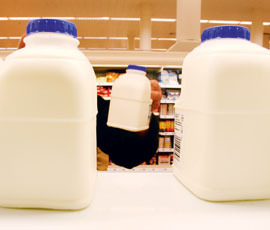Retail milk prices: how the supermarkets measure up

It has been three weeks since we saw milk prices take a big hit for the second time this year and one thing has become clear – everyone is playing the blame game.
Farmers blame processors, processors blame supermarkets, supermarkets blame processors and consumers have very little knowledge of what’s going on – as shown in our milk price videos last week.
To add some clarity to the discussions, Farmers Weekly has investigated who supplies the UK’s 10 largest supermarkets and how much supermarkets pay dairyfarmers.
What we discovered is that some supermarkets are unwilling to answer questions about milk prices. The need for clarity from all parties on the issue is so important, as without it we’re unable to see where improvements can be made.
So what have we learnt?
While all parties in the supply chain have a responsibility over prices – processors have fought each other tooth and nail for retail business – our comparison shows there is a link between supermarket shelf prices and farmgate prices. The three retailers with the lowest shelf prices also pay the lowest farmgate prices.
Cost of production contracts are a good start but these must reflect the true cost of production and be more responsive to changes in costs – we’ve seen this particularly in the past few months when farmers’ costs have rocketed.
The best price being paid by high-street names for standard milk is 32.46p/litre. We should praise M&S and Waitrose for their fair prices and good farmer relationships as they set a high standard for the industry, but let’s not forget that with just over 100 farmers between them, they only buy from 1% of milk producers.
Retail milk prices are now at a seven-year low, which seems bizarre. We may be in a recession and supermarkets are competing hard on price but farmers’ costs have risen, suppliers’ costs have risen and, presumably, supermarkets’ costs have also risen.
While some supermarkets are rewarding farmers with a fair price they are all guilty of selling milk too cheaply. Four pints of milk for £1.18 is less than an average high-street cup of coffee. This devalues the product to the extent that some consumers don’t even realise many farmers are making a loss on every pint they produce.
Consumers will pay more – they’ve told us that – as long as the cash goes into farmers’ pockets.
What we need now is for supermarkets to be open and honest and develop a more respectful relationship with their suppliers. Let’s face it – supermarkets need farmers as much as farmers need them.
See how the retailers measure up on milk prices
Have your say
Have your say on the milk crisis on our forums
